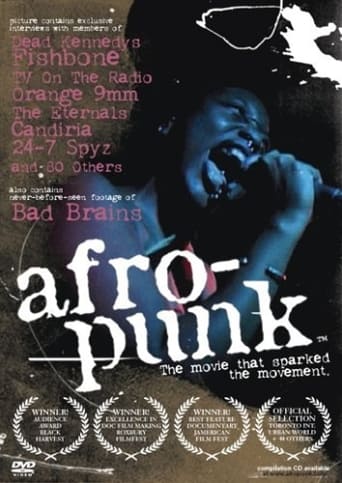rupan777
Great film about blacks in the punk and, in extension, rock scenes both of which are predominantly white. Despite the generally punk setting, this film is really about ethnicity not music though there is plenty of that too. The perspective that the film puts forth is very clear: being a minority group within a minority group and about identity within a group that glorifies itself in self-identity. I was surprised that the film was only an hour plus change but was incredibly dense and thought-provoking. Being Asian myself and having been part of the punk scene growing up, I felt very heartened that a lot of my own thoughts were talked about: personal and ethnic identity, identity within the scene, and finding an avenue to express ethnic identity inside and outside of the scene by breaking stereotype of what is "acceptable" as an Asian.The only real negatives are technical ones: the DVD menus are kind hard to choose from when viewing on a computer due to a wonky cursor that they used and the sound in performances isn't hot either - no soundboard recordings, just miked stuff that comes out a bit distorted. On the flip side to that though, there are some good extras: live performances, trailer, commentary, deleted scenes and interviews.Definitely a recommended watch and essential for ethnic folk in any music scene. Sadly though, even though it's been given good reviews (from what I've read), this documentary probably won't get much attention because of the general audience's unfamiliarity or disinterest with one aspect of its theme or both. It's noteworthy that this is the first effort of the director, James Spooner; I look forward to seeing whatever project he has next.Music-wise, the documentary includes performances and interviews with members of Cipher, Dead Kennedys, Apollo Heights, Fishbone, Candiria, of course Bad Brains and more.
ginkoale
Afropunk is a film that explores the experiences of African Americans living the hardcore/punk lifestyle in the United States. The film presents a surprisingly comprehensive account of the matter as the director captures the lives of a wide variety of black punks and bands that cover many of the subgenres that fall within the banner of hardcore/punk. Even more, the film manages to convey the perspectives of both black males and females, which is rather impressive, considering the fact that most punk scenes are unfortunately dominated by (white) males. Whether in the suburbs or in the city, the point reiterated in the film is that there is a terrible lack of racial minorities who are participating in the punk movement. And why should this be? Especially considering the importance of the anti-racist message within punk rock, it doesn't seem to make much sense that white males should dominate a subculture that is supposed to strengthen a demographic that has been excluded from mainstream society. I think the overall message in Afropunk is not that punk is not black enough, but rather, punk in America is way too white.
moe-79
This film, which many may assume is a historical punk documentary, actually is an honest and needed treatment of race and identity. Punk and Hardcore music is simply the microcosm in which it is told. First time Director, James Spooner, in telling this story, has opened new dialogues on these crucial subject both intra and interracially. Many times funny, sometimes sobering, a wake up call to America. An examination of the duality of racial identity that DuBois called "double consciousness." What could have been "The Bad Brains Story" is a story about kids, alienated by two cultures and two communities. Many of these punk and hardcore kids have never questioned their role in the punk scene or the black community until their interviews, and it's obvious as they struggle on camera to reconcile a fragmented self. Brilliant.
jazzest
Afropunk, a documentary about black kids in the US punk rock scene, represents an honest voice of director James Spooner, whose experience as a minority inside a minority community (a black in a punk community or a punk in a black community) parallels the film's four main characters' stories. The documentary comprises interviews, the interviewees' lives, and their live performances. While the interviewees do not know each other, their experiences are similar: born and raised in a predominantly white neighborhood, being only one black person in a local punk scene, dating almost exclusively white boys/girls due to the interest proximity, admiring legendary black punk band Bad Brains, and trying to establish and maintain their ties to the black community. According to the director, the film has been appreciated by both the mainstream black audience and the mainstream (mostly white) punk audience, as well as by comparatively small black groups in the alternative art scene. But you have to be neither punk nor black to appreciate the film; it has universal appeal to anyone who feels that they are different from what they are supposed to be.

